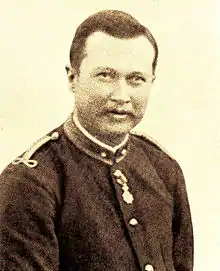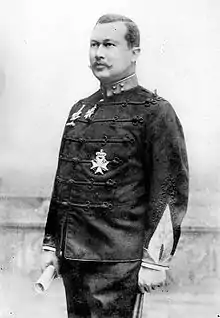Gotfried Coenraad Ernst van Daalen
Gotfried Coenraad Ernst "Frits" van Daalen (23 March 1863 – 22 February 1930) was an Indo (Eurasian) Lieutenant General of the Royal Dutch East Indies Army who served in the Dutch East Indies. He was also the appointed Governor of Aceh from 1905 until 1908.
Gotfried Coenraad Ernst van Daalen | |
|---|---|
 Frits van Daalen | |
| Born | 23 March 1863 Makassar, Dutch East Indies |
| Died | February 22, 1930 (aged 66) The Hague, Netherlands |
| Allegiance | |
| Service/ | Royal Dutch East Indies Army |
| Rank | Lieutenant General |
| Commands held | KNIL |
| Battles/wars | Aceh War |
Biography

Van Daalen was named after his Dutch father Gotfried Coenraad Ernst (Frits) van Daalen (born in 's-Hertogenbosch, the Netherlands 23 July 1836 and died in Surabaya, 13 May 1889), also a famous, decorated KNIL officer and veteran of the Aceh War, who was discharged from service as a consequence of a scandal where he publicly offended the Governor-General of the colony.
As a young officer in the rank of Lieutenant and Captain Van Daalen was awarded several prestigious military distinctions for proven bravery. He first became Knight of the Military William Order in 1890, was awarded the Honorary Sabre by the Dutch monarch in 1897, followed by becoming an Officer of the Military Willem Order in 1898.[1]
Although notorious due to his controversial approach during the final phases of the protracted Aceh War and his consequent conflicts with both Van Heutsz and Snouck Hurgronje, he was appointed Governor of Aceh between 1905 and 1908.[2]
He was eventually promoted to the highest rank of Luitenant-generaal in 1909 and became Commander of the KNIL in 1910, before retiring and repatriating in 1914.
The Van Daalen Campaign Controversy
Van Daalen's "Gajo-, Alas-, and Batak Campaign" of the Aceh War in 1904 is mostly remembered for his hard crack down of the last Acehnese and Batak pockets of resistance. Van Daalen's force included 10 European officers, 13 European non-commissioned officers and 208 Javanese and Ambonese military police officers (Dutch: Marechaussee). Particularly the battle at Koetö Réh stood out, as the rebels refused to surrender and the death toll of 561 fighters included 189 women and 59 children.
The Dutch press reported on the death toll and published images of the brutal warfare in Aceh shocking Dutch public opinion. Heavy critique from the Dutch House of Representatives called for an investigation into the alleged atrocities and damaged the KNIL's overall prestige. In the heated debate Van Daalen himself was compared to the Iron Duke of Alba, a notoriously harsh and cruel ruler from Dutch national history. Although absolved from any crimes, Van Daalen's reputation remained stained and all his subsequent promotions were therefore contentious.
 Van Daalen (second from the left) and four of his senior officers during the "Gajo-, Alas-, and Batak Campaign", 1904.
Van Daalen (second from the left) and four of his senior officers during the "Gajo-, Alas-, and Batak Campaign", 1904. The infamous photograph of the Koetö Réh rebel stronghold after the KNIL troops destroyed it, that swayed Dutch public opinion against Van Daalen's hard approach during the final stages of the Aceh War.
The infamous photograph of the Koetö Réh rebel stronghold after the KNIL troops destroyed it, that swayed Dutch public opinion against Van Daalen's hard approach during the final stages of the Aceh War.
References
- Note: Many other distinctions followed in the later part if his career.
- Naarding, W. Het conflict Snouck Hurgronje-Van Daalen. Een onderzoek naar de verantwoordelijkheid. (Utrecht, 1938)
External links
| Wikimedia Commons has media related to Gotfried Coenraad Ernst van Daalen. |